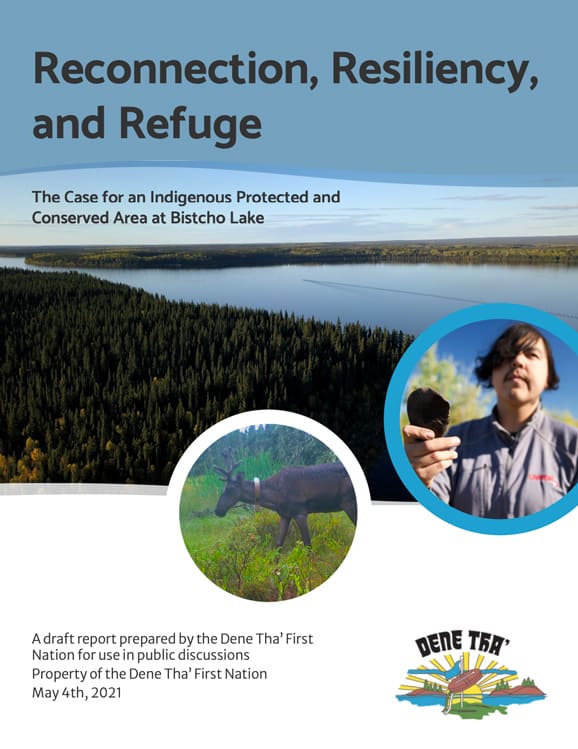This website is being updated. Updates will reflect on the end of 2024.
Vision for Bistcho
The Bistcho IPCA is an Indigenous-led initiative by the Dene Tha’ First Nation to formally conserve and protect part of their Traditional Territory that overlaps with northwestern Alberta.
The management vision describes the future state that is desired for the IPCA.
About the Bistcho Region
The Bistcho region has been occupied and used by the Dene Tha’ First Nation since time immemorial and remains an extremely important cultural, spiritual and harvesting place.
This land lies in the northwest corner of Alberta, bordered by both British Columbia and the Northwest Territories. Its namesake comes from the lake of the same name and means “Big Knife” in Dene.
The Dene Tha’ First Nation have long been connected to Bistcho Lake and the surrounding region and continue to practice their traditional activities on the land today.

Management Vision for Bistcho
The vision statement describes the future state and management regime that is desired for the Bistcho IPCA.
Vision for the Bistcho Region
The Bistcho Indigenous Protected and Conserved Area (IPCA) is a diverse and ecologically intact mosaic of dynamically functioning boreal forest and peatland communities. The vast wetlands in the region sustain balanced hydrological processes, and naturally sustaining wildlife populations roam freely across the landscape. Species-at-risk find refuge in this protected place, and the Bistcho caribou herd returns to self-sustaining population levels that can support sustainable levels of First Nation harvesting.
Management Intent
Cooperatively managed by the Dene Tha’ First Nation and the Government of Alberta, the Bistcho IPCA is a Canadian leader in the collaborative management of protected places. Management of the park recognizes and respects the rights of the Dene Tha’ First Nation and prioritizes the protection of both cultural heritage and ecological integrity.
The Dene Tha’ are involved in all stages of management planning and Traditional Knowledge continues to inform adaptive management practices. Dene Tha’ First Nation continue their traditional practices on the land and freely exercise their Treaty rights. Community members are employed as Indigenous Guardians to undertake adaptative co-management plan implementation activities towards land and water stewardship and monitoring. Youth, elders and harvesters have many opportunities to foster deeper connections with their ancestral lands and with other land users.
Resiliency and Refuge
The Bistcho IPCA remains relatively wild and largely undisturbed from incompatible industrial and recreational activities. Visitors seeking a backcountry experience are respectful of the land and Dene Tha’ culture, and any recreational activities are low-impact and do not compromise the cultural or natural heritage of the area or the peaceable and quiet enjoyment of it. The rich cultural history of the Dene Tha’ First Nation is acknowledged and celebrated in any public outreach or communication materials.
In the face of a changing climate, the Bistcho IPCA contributes to social and ecological resiliency and provides a refuge for future generations of both people and wildlife to co-exist in long-term equilibrium.
The Case for an IPCA at Bistcho Lake
An IPCA is an opportunity to combine existing environmental monitoring programs and an Indigenous-led Guardians program to manage the area using traditional knowledge and western science together.
We invite you to learn about what makes Bistcho special – both culturally and environmentally – and why this place needs protection as an IPCA.
Download the proposal for an IPCA at Bistcho Lake.
Guiding Principles for the Bistcho IPCA
The management principles are largely based upon the principles of ecosystem-based management and will guide decision making for the Bistcho IPCA.
Adaptive Management
The priorities of the adaptive management framework will be identified through knowledge co-production. Epistemologies and methods from both Traditional Knowledge and western science will be used in adaptive management planning and decision-making.
The Precautionary Principle
The lack of certainty regarding a potential threat to the environment should not be used as a reason for not taking action to avoid or mitigate that threat. Application of this principle in situations of uncertainty promotes action to avert the risk of serious or irreversible harm to the environment.
UNDRIP Article 29-1
Indigenous peoples have the right to the conservation and protection of the environment and the productive capacity of their lands or territories and resources. States shall establish and implement assistance programmes for Indigenous Peoples for such conservation and protection, without discrimination.
Accountability and Transparency
Responsibilities are clear, deadlines are established and achieved in a timely manner, and progress is tracked and reported to the public.
Inclusivity and Participation
Public participation and community engagement is encouraged and facilitated.
Sustainable Use
Resource development and recreational use of the area must support the ecological integrity of the area and traditional and cultural use locations.
Appropriate Research and Monitoring
Community-based monitoring will identify ecological indicators to monitor ecosystem processes and health. Based on monitoring needs and identified ecological issues, research programs will be implemented to collect data necessary to support management objectives. Management strategies will be developed to assist in the protection of known endangered, threatened or otherwise significant species.
The conservation and management of the Bistcho Lake region cannot wait until it is formally protected. See our projects.

